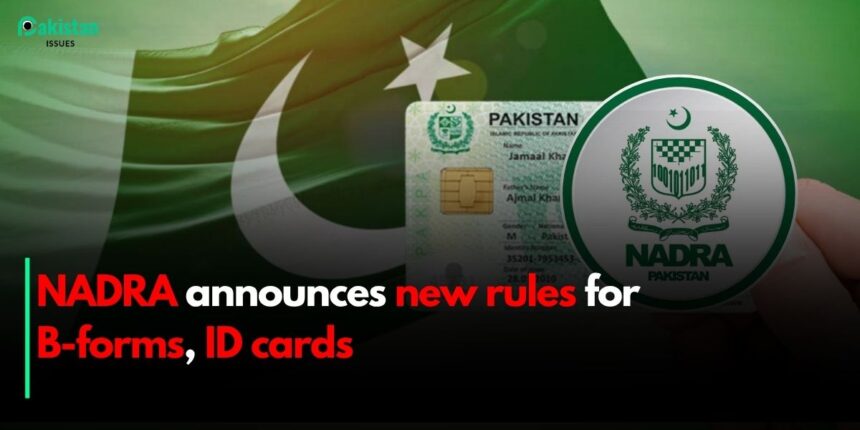In a sweeping update approved by the Federal Cabinet on June 20, 2025, NADRA has introduced significant reforms to the rules governing B‑Forms (Child Registration Certificates), CNICs, and Family Registration Certificates (FRCs). These changes—driven by Interior Minister Mohsin Naqvi—aim to modernise identity verification, bolster security, and simplify procedures for citizens.
B‑Form Enhancements
Under the updated rules:
- Mandatory birth registration at the local Union Council is now required before issuing a B‑Form (CRC).
- Biometric exemptions apply for children under 3 years old—no photos or iris scans needed.
- Photo + optional iris scans required for ages 3–10.
- Full biometrics, including fingerprints, iris scan, and photo, are required for ages 10–18.
- Time-bound validity: Each B‑Form is now valid for a defined period, improving tracking efficiency and reducing misuse risk.
These changes are intended to enhance data accuracy and help prevent illegal registrations, trafficking, and identity fraud.
Family Registration Certificate Gets a Legal Boost
The FRC has now been formalised by law, with families required to:
- File an undertaking confirming the truthfulness of submitted information, verified against NADRA records.
- Choose from three categories:
- Alpha: biological family
- Beta: through marriage
- Gamma: via adoption
- Register all family members, including multiple spouses in cases of polygamy, ensuring clarity in family compositions.
- Update or correct family details through NADRA’s app or offices—wrong entries can now be deleted more easily.
Smart and Secure New CNICs
CNICs (also known as “Teslin cards”) are now strictly Teslin-based smart cards, featuring:
- QR codes that replace thumbprints, available at no added cost
- Bilingual data in English and Urdu for national and international use
- Enhanced security features, included in the standard card
Additionally, NADRA must now resolve verification, cancellation, and confiscation requests—covering CNICs, B-Forms, and FRCs—within 30 days through newly mandated district, regional, or headquarters-level verification boards.
User-Friendly Tools and Corrections
In another citizen-centric change, NADRA has introduced:
- A mobile app (Pak‑ID) for online B‑Form applications, downloadable on Android and iOS—allowing parents to complete the process without visiting centers
- A voluntary correction centre, enabling individuals to flag incorrect data—like misspellings or outdated addresses—for accurate, legal updates without penalty
Why These Changes Matter
The new rules aim to:
- Tighten identity security, reducing instances of fake registrations and trafficking
- Empower citizens with flexible choices—such as married women choosing whether to display their father or husband’s name on CNICs
- Improve efficiency, reducing wait times and paperwork through faster verification and online tools
- Boost digital governance, aligning identity systems with other institutions such as FBR, PTA, and the State Bank by standardising biometric definitions
Final Word
NADRA’s rule updates represent a significant advancement in Pakistan’s identity infrastructure. By bringing together biometric verification, digital tools, augmented security features, and pathways to a citizen correction process, the new blueprint has the potential to be more inclusive, secure, and easily understandable to users. As the implementation of the regulations unfold, we expect Pakistan will see decreasing rates of identity fraud and better integration with the national and provincial digital services.










